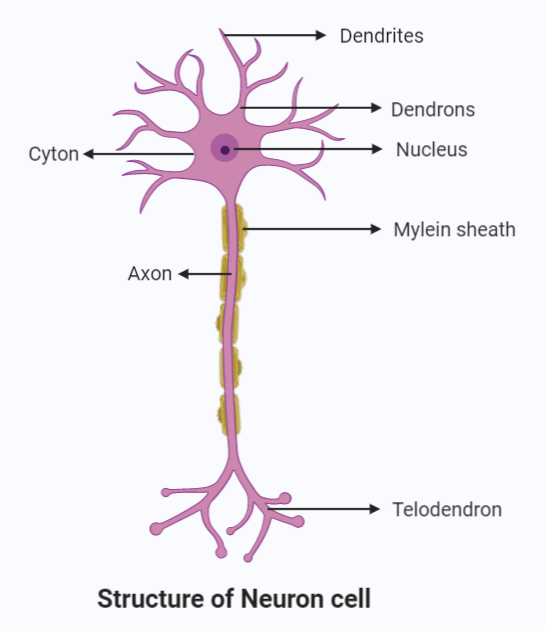
Largest cell in the body is
A. Lymph
B. Osteocyte
C. Neuron
D. Chromatophore
Answer
555k+ views
Hint: The cell is the functional and the structural unit of life and the living body. They are known as the structural unit because it is the smallest unit in any organism capable of sustaining life. It is known as the functional unit because it can perform all the basic functions necessary to life.
Complete step-by-step answer:
Neurons are nerve cells. These cells make up the nervous system of our body. These cells are therefore found in the brain and the spinal cord. They are the longest and the largest cells in the body. Sometimes they grow to the length of several feet. These cells do not divide and replicate and are an exception to the cell theory.
Neurons are made up of two parts. These two parts are the cyton or the cell process or cell bodies. Cyton is the flat part that is also known as the soma or perikaryon. The cell process is divided further into dendrites and axons. The cyton has a nucleus, Nissl’s granules for protein synthesis, cytoplasm, and several dendrites originating from the cyton to help in the impulse conduction. The cell body has a long part axon. The axoplasm along with its layer is known as axolemma. Axolemma has Schwann cells for the formation of the myelin sheath to prevent the leakage of signals. The point where this sheath is absent is known as the Node of Ranvier.

Thus, based on the above information we can conclude that the largest cell in the body is the neuron.
Hence, the correct answer is an option (C).
Note: Chromatophore cells are present in the retina of the eye. These cells contain black pigment. They help in reflecting the light. Chromatophore cells are sometimes one of the largest cells at maturity. However, immature chromatophores are small in size. Also, all chromatophores do not become large at maturity. Due to this reason, the correct answer is the neuron.
Complete step-by-step answer:
Neurons are nerve cells. These cells make up the nervous system of our body. These cells are therefore found in the brain and the spinal cord. They are the longest and the largest cells in the body. Sometimes they grow to the length of several feet. These cells do not divide and replicate and are an exception to the cell theory.
Neurons are made up of two parts. These two parts are the cyton or the cell process or cell bodies. Cyton is the flat part that is also known as the soma or perikaryon. The cell process is divided further into dendrites and axons. The cyton has a nucleus, Nissl’s granules for protein synthesis, cytoplasm, and several dendrites originating from the cyton to help in the impulse conduction. The cell body has a long part axon. The axoplasm along with its layer is known as axolemma. Axolemma has Schwann cells for the formation of the myelin sheath to prevent the leakage of signals. The point where this sheath is absent is known as the Node of Ranvier.

Thus, based on the above information we can conclude that the largest cell in the body is the neuron.
Hence, the correct answer is an option (C).
Note: Chromatophore cells are present in the retina of the eye. These cells contain black pigment. They help in reflecting the light. Chromatophore cells are sometimes one of the largest cells at maturity. However, immature chromatophores are small in size. Also, all chromatophores do not become large at maturity. Due to this reason, the correct answer is the neuron.
Recently Updated Pages
Master Class 11 Computer Science: Engaging Questions & Answers for Success

Master Class 11 Business Studies: Engaging Questions & Answers for Success

Master Class 11 Economics: Engaging Questions & Answers for Success

Master Class 11 English: Engaging Questions & Answers for Success

Master Class 11 Maths: Engaging Questions & Answers for Success

Master Class 11 Biology: Engaging Questions & Answers for Success

Trending doubts
One Metric ton is equal to kg A 10000 B 1000 C 100 class 11 physics CBSE

There are 720 permutations of the digits 1 2 3 4 5 class 11 maths CBSE

Discuss the various forms of bacteria class 11 biology CBSE

Draw a diagram of a plant cell and label at least eight class 11 biology CBSE

State the laws of reflection of light

Explain zero factorial class 11 maths CBSE




